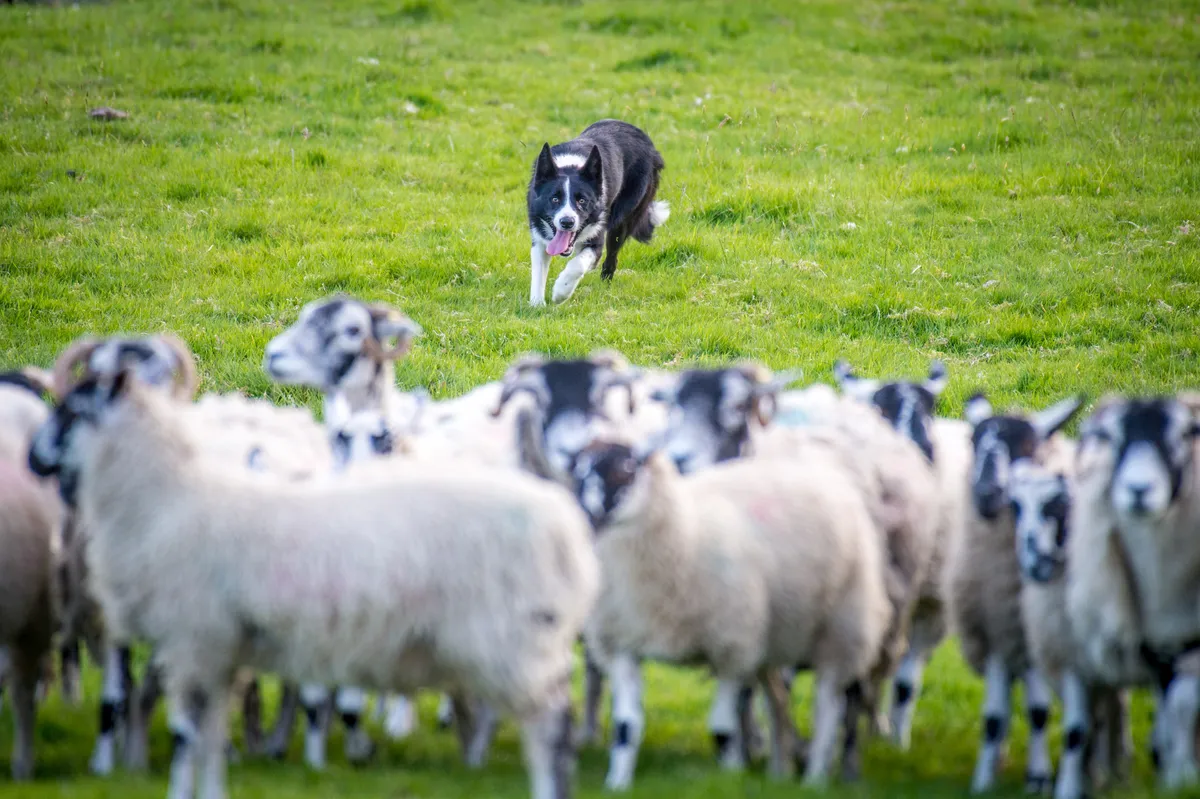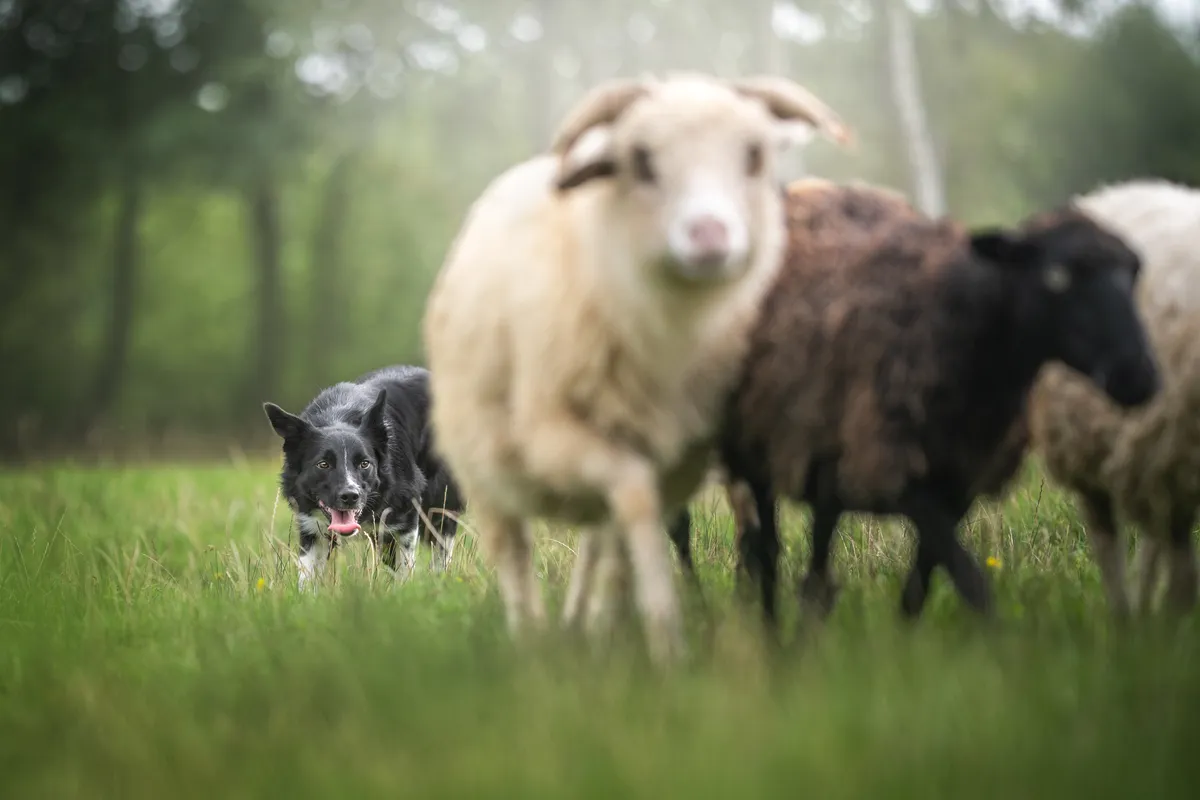Inching ever forward with supreme stealth, eyes locked into a mesmerising glare, focused, driven and relentless in intent. There are few people not familiar with the unique working artistry of the Border collie – the most successful livestock herding dog the world has ever seen.
But how many people really understand the more remarkable minds that exist within these dogs? Holding the secrets of not just their exceptional working brilliance and intelligence, but their wider mental vulnerabilities, too.
For the greater part of my life I have owned, bred, lived and worked with Border collies, and – as a canine behaviourist specialising in them as a breed – striven to get to the heart of what really makes them tick. Of particular fascination to me, always, is why dogs who can be so exceptionally smart, biddable, loyal and rewarding in some ways can be so psychologically complex in others and prone to a wider range of different obsessions, phobias, neuroses and anxieties that so often makes them more challenging to own as pets.

The autistic canine
The answer, I now believe, is that they have minds that are intrinsically more autistic in design, a realisation that only slowly dawned on me after I’d had wider personal experience of autistic people within my circle of friends. The way in which so many human autistic traits could be found mirrored in Border collies – albeit in a more species-specific form – just started to become too consistent to ignore, in everything from their greater sensory and social difficulties to their obsession with repetitive behaviours, sameness and control.
So many human autistic traits can be found mirrored in Border collies.
Once we realise that the Border collie has more autistic thinking and impulses, it is also easier to appreciate that what we might view as ‘working instinct’ in them around livestock is really a form of canine obsessive compulsive disorder (OCD). For not only is the dog quite happy to repeat the same endless cycle of eye-stalk-chase-herd behaviour again and again, without there ever being any more logical reward attached to it (in other words, ‘prey’ it can catch, kill or eat), but – as many pet collie owners soon discover – it is also quite happy to direct the same instinct on to anything else that moves, even things such as dust, lights, leaves or water.

Managing ‘working instinct’
As a collie owner, the best way to view working instinct in your dog is as a genetically pre-programmed mental itch your dog will regularly need to scratch. It will see something that moves, then feel compelled to fixate on it and thereafter chase and control it.
How much working instinct any collie has and at what age this behaviour more fully kicks in can vary greatly from dog to dog. But shepherds will typically introduce their young dogs to sheep at around four to six months of age, to ensure that any developing working instinct in them immediately gets locked on
to the most appropriate target: livestock.
What tends to go wrong with collies kept as pets is that this instinct is allowed, instead, to escape on to a host of other less desirable targets. Traffic, trains, cyclists, runners or birds are common examples. And once a collie has picked its own preferred chase or working target in this way, it can – without better training – rapidly become ever more obsessed with it.
What we might view as ‘working instinct’ in Border collies around livestock is really a form of canine obsessive compulsive disorder.
With my own dogs, for example, in the absence of owning livestock, I deliberately fixate all their developing working instinct on to a set toy – a ball – from a very young age. Once the dog has built up a set idea in its mind of what it can chase, it loses interest in any other surrounding options.
How you use this ball in training, however, is also critical. You will notice that a shepherd never just lets their dog charge up to livestock at speed, or hare round them excitedly in any manner it chooses, like so many pet collie owners let their dogs do with endless ball chasing. They discipline the dog’s mind and actions around its chase/working target instead. Training it to understand when it can, or must not, approach livestock, and when it must lie down or wait, or leave the livestock altogether and return to its handler. I do all the same control exercises with my dogs – with a ball instead of sheep – and any owner can do the same to gain more control of their dog’s working instinct.
In terms of exercise, collies need regular distance walks, where they have plenty of opportunity to run off-lead. They don’t all have to be marathons. An hour twice a day is fine, but do be aware that the more exercise you start to give a collie, the more it will always want or expect.
Cooling down a hotter mind
Many collies struggle with mental hyper-arousal, or the tendency to quickly enter and sustain a highly excitable mental state. It is a trait that so often – and so wrongly – gets them dubbed a ‘crazier’ breed, when it simply derives from the far higher levels of sensory and mental responsiveness that have been bred into them as sheepdogs.
Collies’ minds can be kept cooler either with self-calming exercises such as “down, wait, watch me”, or by removing the dog from any environment causing it excessive sensory distress. It can also be best to make the place at home where your dog rests, or spends most of its time, as quiet as possible.

The breed spectrum
Not only do I believe that Border collies can have intrinsically autistic minds, but also that they have their own more breed-specific autistic spectrum. Which explains why the genetic personalities of these dogs can vary so much. My books outline how you can assess where your own dog falls on this spectrum of autistic traits, and how you can tailor your training and management of them accordingly. Because it can really make such a difference to the quality of life you share with your collie.
A more autistic mind may sometimes make collies more challenging as pets, but it is also often behind everything that makes them so special as dogs – their legendary work ethic, courage, constancy and supreme intelligence. They may take some understanding and some work but still, for me at least, there really is no other breed to match them in this world.
- Dog walking guide: expert training tips to help your dog behave
- Alabama rot dog disease: how to spot the signs and protect your dog

A genuine wonder breed
The Border collie’s unique abilities as a dog lie not just in its supreme physical athleticism – it can run at up to 48kph and easily jump 1.8 metres from a standing start – but also its outstanding intelligence and mental versatility. These dogs have proved themselves capable, for instance, of memorising and recognising over 1,000 different toys by name, on top of a wealth of other training commands. And as well as dominating and winning just about every form of canine competition around – from obedience and flyball to agility – they are now found in so many working roles other than livestock management. Worldwide, Border collies work in search and rescue teams, as assistance dogs, and perform scentwork, sniffing out anything from drugs, money or dead bodies for law enforcement agencies to dry rot in buildings before surveyors can detect it.
Border collies are capable of memorising and recognising over 1,000 different toys by name, on top of a wealth of other training commands.
Is your dog autistic?
Traits or behaviours suggestive of a more autistic dog-mind include:
- Obsessive/repetitive/OCD-type patterns of behaviour
- Hyperactivity
- Hypersensitivity to sound (including more intense noise phobias), light, movement and touch
- Fear or dislike of ‘the new’ or any change in routine and a greater desire for ‘sameness’ in all aspects of daily life
- Self-stimulatory behaviours, such as light or shadow chasing, or more persistent licking of walls, bedding, carpets or furniture
- Anxiety disorders
- Higher social anxiety or reserve
- Problems with social recognition and connection
- Higher need for control in all aspects of daily life
- More reactive/explosive patterns of aggression when under mental pressure, that the dog often struggles to control.
Note: Some dogs may have more or fewer of these traits and others may have them in milder or more severe forms.
Carol Price is a canine behaviourist, writer and world-recognised expert on the Border collie breed and an ambassador for the Border Collie Trust GB. Carol’s books include Collie Psychology: Inside the Border Collie Mind (Performancedog.co.uk). For expert collie advice and tips, see facebook.com/collieology.




